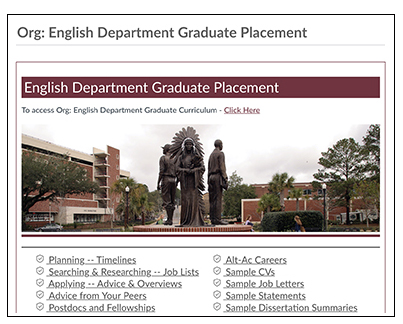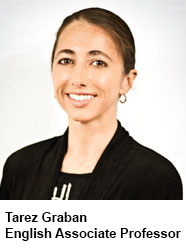Job placement resources offer English graduate students tools necessary to improve future options
By Sara Sanfilippo
As students in master’s and doctoral programs near graduation, many find themselves preparing for job interviews and visualizing their lives after their commencement ceremony. Many of them may not know where to start or are not aware of the skills needed to land their future job.
English department graduate students fortunately have the opportunity to enroll in a Placement Practicum course, where they can gain valuable interview and job talk experience, work on written materials, and learn more about professionalism concerning their desired career.
Associate Professor of English Tarez Graban has been the Graduate Placement Director since August of 2019. She leads the Job Placement Committee, which is composed of the placement director and two additional faculty members. They discuss several job-related topics with students, including different elements of their work, tenure, administrative reports, and grant narratives.
“Placement in FSU English means two things in tandem: mentoring our graduate students for the job market and helping our graduate students to layout and enact their own rigorous professional trajectories, whether those trajectories include academic or non-/alt-academic positions,” Graban explains.
The Placement Practicum course is available to students during the fall semesters. The course is credit-bearing for students who are finishing up their graduate studies and on the job market. The students are able to develop relationships with supportive peer cohorts during their job search.
“The practicum has been a nice space for students to interact across programs, to expose one another to their research or creative work, and to cross-pollinate placement strategies,” Graban says.
The only requirement to take part in this course is to be enrolled as a graduate student. However, the practicum requires the students to successfully pass their prospectus and complete their graduate work or begin to job search within the same year.
 “We are encouraging students to think about their professionalization goals and needs at the very beginning of their programs and to see those goals and needs as working in tandem with their intellectual journeys,” Graban says.
“We are encouraging students to think about their professionalization goals and needs at the very beginning of their programs and to see those goals and needs as working in tandem with their intellectual journeys,” Graban says.
During her time as director, Graban added the practicum, conducted a number of open workshops and roundtables, and is currently working on creating an alumni contact network.
Graban is not the first director to lead this program, but she has had the added challenge of working around a pandemic. COVID-19 restrictions required Graban to adjust the schedule of the program in order to keep everyone safe.
Before COVID and the campus closures, all the activities were in person.
“I do miss the ambient experience: the materiality of being together around a table for the practicum, or gathering together in a room for a podium talk or teaching presentation,” Graban says.
Nevertheless, Graban has integrated especially helpful elements into the coursework, such as mock job interviews and mock job talks. These provide the students with practice presenting their research in front of an audience and hearing feedback from professionals.
Dyan Neary, a doctoral student in Creative Writing-Nonfiction, took part in the practicum, and she recently presented a mock job talk to help her prepare for upcoming job interviews.
“It was great,” Neary says, referring to the late-January event. “I got so much encouragement and I feel like I was able to go into the interviews with a lot more confidence about my research and about the presentation in general.”
Not long after Neary’s presentation, she accepted a job as a tenure-track assistant professor position at West Chester University in Chester County, PA. Starting in the fall of 2021, Neary will teach undergraduate and graduate courses in narrative nonfiction and journalism and help develop WCU’s journalism minor into a major.
Neary was one of many graduate students who rehearsed their job interviews in front of a group of faculty members. Following each presentation, the faculty provide feedback and comments to help students perfect their work and adequately prepare them for the actual interview process.
“Everyone was kind, encouraging, and asked thoughtful questions,” Neary says, regarding the feedback. “I would recommend [the mock job talks] to anyone on the job market.”
Despite the disruptions because of COVID-19, the Placement Committee, practicum, and the mock job talks have remained successful. All of the activities are currently remote, but Graban says this environment plays to the students’ benefit, as job interviews and talks are also virtual at the moment.
Graban is “hopeful that things will swing the other way in the next year or two,” and allow for everything to be in person once again.
Virtually or in person, the Job Placement Committee and practicum continue to provide extra sets of eyes to look over and develop feedback for graduate students’ job applications and interview materials in preparation for future career success.
Sara Sanfilippo is an English major, on the editing, writing, and media track, with a minor in retail operations.
Follow the English department on Instagram @fsuenglish; on Facebook facebook.com/fsuenglishdepartment/; and Twitter, @fsu_englishdept

